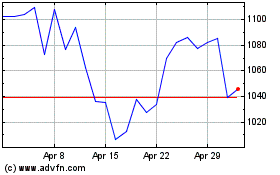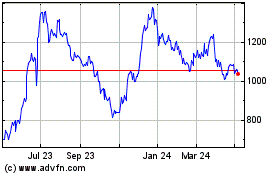By Rory Jones and Summer Said
This article is being republished as part of our daily
reproduction of WSJ.com articles that also appeared in the U.S.
print edition of The Wall Street Journal (May 18, 2020).
In the coronavirus pandemic's financial fallout, Saudi Arabia's
$300 billion sovereign-wealth fund has emerged as one of the
world's biggest bargain hunters, taking minority stakes worth
billions of dollars in American corporations.
The Public Investment Fund in the first quarter bought shares
valued at about half a billion dollars each in Facebook Inc., Walt
Disney Co., Marriott International Inc. and Cisco Systems Inc.,
according to a U.S. regulatory filing late Friday.
The fund bought financial stocks, investing $522 million in
Citigroup Inc. and $488 million in Bank of America Corp., while
also spending $714 million on a stake in Boeing Co.
The purchases, reported in a filing with the Securities and
Exchange Commission, follow disclosures last month of stakes each
valued at nearly $500 million in cruise operator Carnival Corp. and
concert promoter Live Nation Entertainment Inc.
Crown Prince Mohammed bin Salman, the kingdom's day-to-day
ruler, tasked the sovereign-wealth fund in 2015 with diversifying
the country's economy away from oil by investing in companies and
industries untethered to hydrocarbons.
PIF's recent buying spree highlights a bold strategy of piling
into global stocks even as the novel coronavirus and a crash in oil
prices mean that Saudi Arabia's financial position is now the most
precarious in a decade. The Saudi government last week tripled its
value-added tax rate and cut subsidies to state employees as it
contends with lower oil revenue and an economy weakening under
coronavirus lockdown.
While PIF has dipped into stocks in recent years, the fund has
focused more on private equity, allocating capital to managers such
as SoftBank Group Corp. Its record is mixed. PIF's $45 billion
investment in the Vision Fund has suffered losses and its
pre-listing investment in Uber Technologies Inc. of $3.5 billion is
currently down 40%.
PIF's move into equities is particularly bold as few funds
appear to be buying, according to Javier Capapé, director of
sovereign wealth research at Spain's IE University.
Sovereign-wealth funds used the financial crisis 10 years ago as an
opportunity to snap up cheap stakes in many Western companies, but
the wider impact of the current crisis means many nations with
rainy-day funds aren't out buying, said Mr. Capapé.
"So far only PIF has made these big and bold movements," he
added.
Many of the stocks that PIF has targeted are trading at historic
lows, bruised by the fallout from the coronavirus and rock-bottom
oil prices that have battered stocks of energy companies this
year.
PIF's recent equity purchases in oil companies also have bucked
Prince Mohammed's original mandate for the fund. It set out to
invest in nonoil companies that can help establish new industries
in technology, tourism and entertainment, or act as a hedge against
the decline of oil, the kingdom's biggest asset.
However, The Wall Street Journal last month reported that the
fund had bought undisclosed stakes in a bevy of energy companies,
including Equinor ASA, Royal Dutch Shell PLC, Total SA and Eni
SpA.
PIF invested $484 million in Shell, $222 million in Total and
previously unreported stakes of $828 million in BP PLC, $481
million in Suncor Energy Inc. and $408 million in Canadian Natural
Resources Ltd., according to the U.S. filing.
"We actively seek strategic opportunities both in Saudi Arabia
and globally that have strong potential to generate significant
long-term returns while further benefiting the people of Saudi
Arabia and driving the country's economic growth," a PIF
spokesperson said.
The Saudi fund invested in oil stocks during a period when
Prince Mohammed attempted to assert control over the oil market.
Saudi Arabia and Russia failed to agree on production cuts in early
March, so the prince flooded the market with cheap crude, creating
a glut of supply as the pandemic lowered global demand.
The price of Brent, the global benchmark, fell by half to $25 a
barrel in the middle of March, driving down share prices of major
oil companies. Saudi Arabia subsequently attempted to revive the
oil market by agreeing to production curbs in a deal on April
12.
According to the U.S. filing, PIF bought shares in oil companies
during the first three months of the year, though it isn't clear
whether the fund bought those stocks after the market sentiment had
weakened. It purchased the stake in Norway's Equinor between March
30 and April 6.
Outside the oil industry, PIF bought stakes in the first three
months of the year worth $496 million in Disney, $522 million in
Facebook, $491 million in Cisco and $514 million in Marriott, the
filing shows.
It also purchased shares valued at roughly $80 million each in
Warren Buffett's Berkshire Hathaway Inc.; chip makers Broadcom Inc.
and Qualcomm Inc.; International Business Machines Corp.; drugmaker
Pfizer Inc.; Starbucks Corp.; railroad company Union Pacific Corp.;
outsourcer Automatic Data Processing Inc.; and Booking Holdings
Inc., the parent company of Booking.com.
The Saudi fund's public investments in the first quarter look
well timed. It likely made the purchases ahead of the U.S. stock
market's March 23 low, caused by growing concerns about the
economic impact of the coronavirus. U.S. markets have rallied
since. Disney and Facebook are up 13% and 26%, respectively, since
March's end, and Marriott, which cut tens of thousands of jobs
because of the pandemic, is up 6.6%. Facing a prolonged period of
tepid global demand from airlines for its planes, Boeing is down
19% since the end of March.
PIF's spending comes months after Saudi Arabia listed national
oil company Aramco, helping raise nearly $30 billion for the fund
to deploy. But the kingdom's finances have deteriorated since then,
and the government expects to draw down $32 billion from foreign
reserves and borrow billions from capital markets this year. The
fund is also facing a lower windfall from the sale of the kingdom's
national petrochemical company to Aramco, a transaction previously
valued at $69 billion that the two sides are renegotiating to a
lower price.
On top of the stakes in public companies, PIF is also awaiting
regulatory approval for a roughly GBP300 million ($363 million)
buyout of U.K. Premier League soccer team Newcastle United F.C.
Write to Rory Jones at rory.jones@wsj.com and Summer Said at
summer.said@wsj.com
(END) Dow Jones Newswires
May 18, 2020 02:47 ET (06:47 GMT)
Copyright (c) 2020 Dow Jones & Company, Inc.
Carnival (LSE:CCL)
Historical Stock Chart
From Mar 2024 to Apr 2024

Carnival (LSE:CCL)
Historical Stock Chart
From Apr 2023 to Apr 2024
